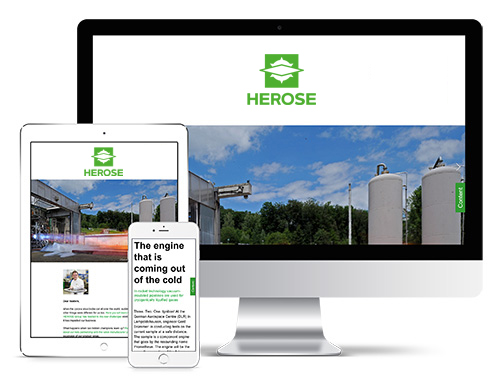Increasingly stringent environmental regulations are forcing Europe’s inland shipping to convert their fleets by 2016. Many shipping lines intend to achieve the target by equipping the diesel engines of their ships with additional filters – an expensive solution.
The Dutch ship owner Gerald Deen used the construction of his new ship, the “Argonon” to implement a revolutionary solution for the first time in Europe. The “Argonon’s” engine can be operated with an unusual mixture, a mixture which can easily comply with future exhaust regulations and which also saves costs: 20 % diesel fuel and 80 % LNG. Deen: “The new engine emits 30 % less CO2 and 80 % less nitrous oxide.” The most obvious difference from a conventionally powered inland waterway ship is the 40 cubic metre gas tank on the deck of the “Argonon”. The Dutch company Cryonorm Projects, a long-standing HEROSE customer, was responsible for the conception of the ship. Director Hans Stuker: „As the “Argonon” will be deployed on the Rhine as a chemical tanker between Rotterdam and Basel, the safety requirements are especially high.” First of all an electric valve drive had to be developed, because there was no compressed air available to control a pneumatic drive. This succeeded with a novel combination of a Schischek drive unit and HEROSE globe valves. This version was worked out with a triumvirate consisting of the customer, the HEROSE development department and Ron van de Weerd, the Dutch agent of the Bad Oldesloe valve manufacturer. HEROSE sees a great potential for this drive unit. It is still not certain whether the “Argonon” will be able to use its gas tank on the entire route from Rotterdam to Basel from the very start. Ship owner Deen: “The European approval authorities find it hard to come to a decision”
Up to now, he can only use LNG on the Dutch side of the Rhine. HEROSE has a similar problem with a different matter. Sales Manager Volker Maass: “At the moment we are in the course of an approval marathon for valves for ships which will use LNG on the Baltic. As of 2015 similar regulations to those on the European waterways will apply.” The reason for this hesitation: The certification companies are afraid of safety problems. According to Maass these worries are completely unfounded: “LNG is safe – and LNG is the fuel of the future. This applies for ships, tucks and busses.” There is a large potential market. Ship owner Gerald Deen, who is also the deputy chairman of the Dutch Association of independent tanker companies, estimates that in the Netherlands alone there is a requirement for the conversion of 50 ships to be converted by 2022. “Everyone is ready to go and simply waiting for the general approval.”
Photo: Carsten Wurr


 Read the current digital customer magazine now!
Read the current digital customer magazine now!
